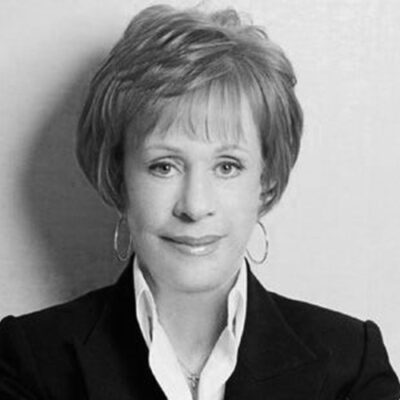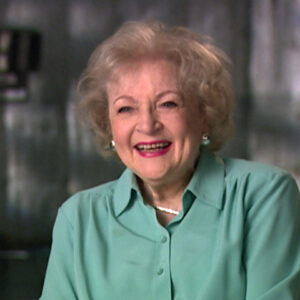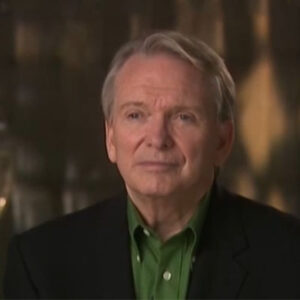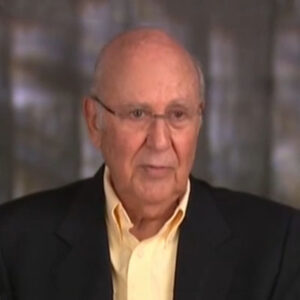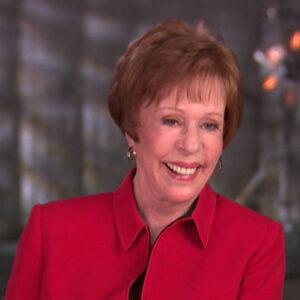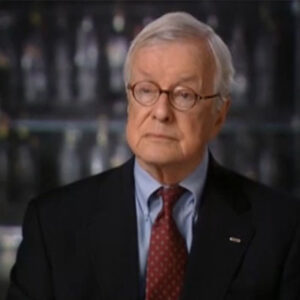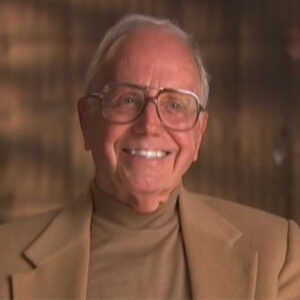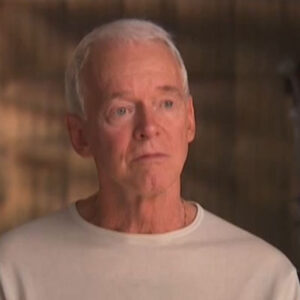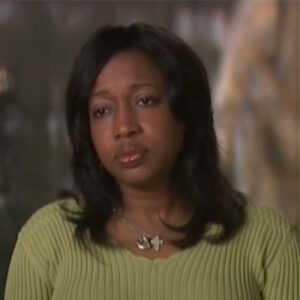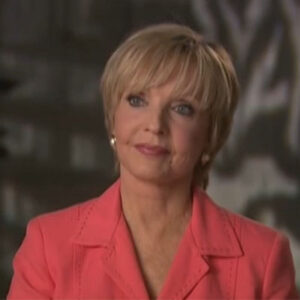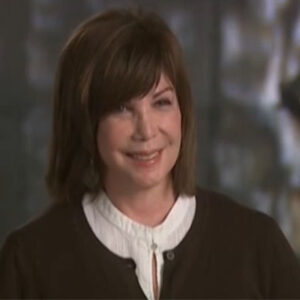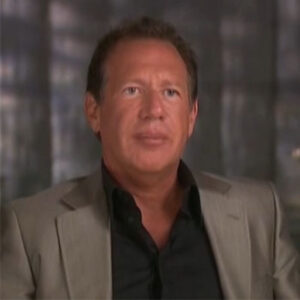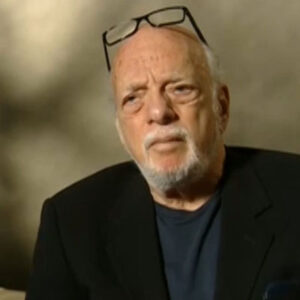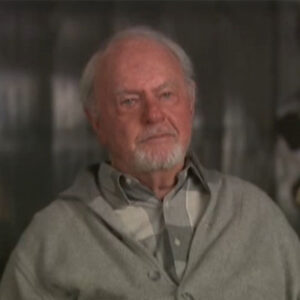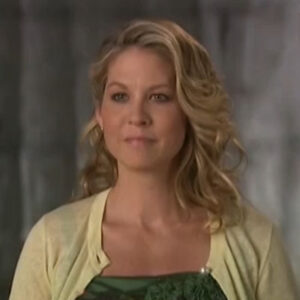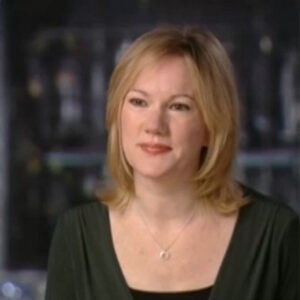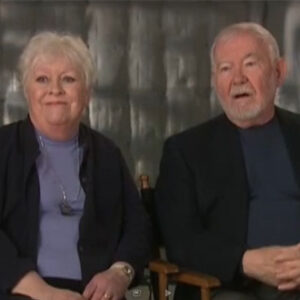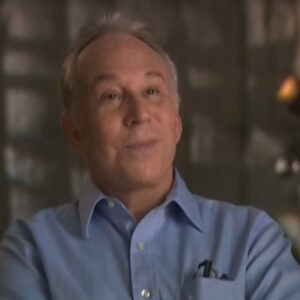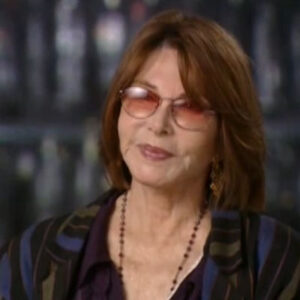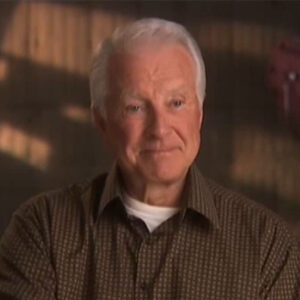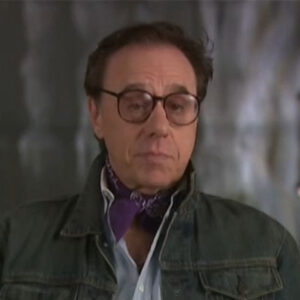Speaker I started in December of nineteen fifty eight. And in those days they called me assistant to the producer. That has evolved now into script supervisors, what they call it now.
Speaker I’m sorry, can you say on which show that was?
Speaker Oh, on The Garry Moore Show. Oh, let me do that again. I messed it up.
Speaker Did you wanted to say when you started your show?
Speaker I started on The Garry Moore Show in December of 1958. And I was called an assistant to the producer. That title has now evolved into what is known as a script supervisor. And that’s where I met Carol on The Garry Moore Show in early 1959.
Speaker And tell me that story. How she is coming on the show.
Speaker I think Carol had done some daytime Garry Moore shows at one point. I’m not positive about that because it was before my time. She came on the Garry Moore nighttime show as a guest a couple of times and then one time and early, I think it was February of 59.
Speaker Martha Raye was due on the show and she had rehearsed all the numbers who were almost up to our show day.
Speaker We were alive in those days and she got sick. Martha got sick. So we made a call to Carol. She didn’t live too far from the studio and she came right over.
Speaker She learned in one day all the sketches, all the music, all the dancing. She was incredible. And everyone was so impressed that it evolved into multiple appearances. And then around the fall of that year, she became a regular on the show.
Speaker Do you remember the very first time what she did when she came on those earlier performances that she did remember what she performed?
Speaker I just remember that she was the bulkhead of a pirate ship and she was some kind of production number that I remember because I think I have a picture of it somewhere, but I couldn’t tell you what sketch or song she did. My memory’s not that good.
Speaker Is he straight? Yeah. Yes. That’s my Charlie cat. Oh, dear. Back again.
Speaker What was the question, when did I start? Yeah.
Speaker The first thing was when you started on The Gary Moore Show and what your position really.
Speaker I started on The Garry Moore Show in December of 1958. At that time, we were called assistant to the producer. And that title has evolved over the years into what is now known as a script supervisor. Carol did a couple of guest appearance appearances in the early part of 1959. And then one day, Martha Raye was due to be on the show. She got sick at the very last minute because we were live in those days. So we were only about a day away from show day and we put in a call to Carol. She lived very close to the studio. She came over eleven o’clock in the morning. She learned every single sketch song, dance numbers all in one day. And she was complete and ready to do a run through before the end of the day. She was absolutely amazing and everyone naturally was very, very impressed. She ultimately did multiple appearances throughout the summer and then in the fall of 1959.
Speaker She became a regular on the show and we were talking about who remembered what her first sketch was. And actually, I’m wondering, do you think one of them was her sketch of the singers? Do you recall her performing?
Speaker Oh, I. I do. You want me to mention that?
Speaker OK. You recall the signature. I was then a Ken Welch. Yes. OK. Introduce that.
Speaker One of the first things I remember her doing was a routine written for her by Kenny Welch called the Singers where she did all these different kinds of singers. And it was it was hilarious. Kenny wrote a lot of her material. He basically started her out with the amazing John Foster Dulles. I’m in love with John Foster Dulles, which she did on Jack Paar and then Ed Sullivan and really brought her to the foreground.
Speaker What was it about her when you saw her? Do the singers fill in for Martha Raye? What was it clear that this was a star was being born? And what was it that was so unique about her?
Speaker Carol is very unique amongst women in comedy. She’s a genius comic actress who can also sing and dance, act in a drama, makes a mean meatloaf and is a generous and loyal friend. She’s just a real prize package.
Speaker Was it also and is it unique as a woman in comedy? I think that’s true. Do you think. Also the fact that I mean, how was she unique to women in comedy things at that time? Women weren’t. You could either be funny or you could be glamorous, but not both. And she seemed to somehow bring the two together.
Speaker I don’t know if you think that’s true.
Speaker I don’t really have an answer for that. What I said before about her being able to say in desert. This is what made her unique as a woman because of that. In those days, there were standup comics mostly. And then, of course, Lucille Ball with the series and so forth, and the race for that office.
Speaker My shirt went funny.
Speaker I was just falling off.
Speaker It was when she filled in for Martha Raye. Is it. Is it correct that first Jerry Moore wasn’t sure you wanted her as a regular? Did some people suggest. I’m not sure yet. Tell me about that.
Speaker Gary found Carol to be enormously talented. There was no doubt about that. He was a little bit reluctant at first for her to become a regular on the show. But he did like the idea of the multiple appearances. That’s why from the time that she did the Martha Raye situation, it evolved from February to sometime in the fall. October, before Gary finally came around to the conclusion that we were all right and he was wrong.
Speaker And they became very, very close friends. He never regretted it.
Speaker Why do you think initially he was reluctant? What were his hesitations?
Speaker I honestly don’t know. I honestly don’t know.
Speaker And talk. Talk. Tell me about their relationship. Was he a mentor to.
Speaker Oh, Gary Moore was the mentor to Carol in her early formative years in show business. He ran the show to have fun and be a family. And that was instilled in Carol. And she carried on that tradition into her own show.
Speaker She said to all of us, the cast and crew, just before we started the series, let’s have fun and love one another. And that’s the way it was.
Speaker Or finish that way.
Speaker Can you remember any of the on the Garry Moore Show still. Any favorite sketches or. Oh, my favorite one.
Speaker My favorite sketch from The Garry Moore Show was Carol was the secretary to Durward.
Speaker I believe this was a Neil Simon sketch and it was called Something Accidents.
Speaker And Derwood was her boss and everything she did in your car pencil in the arm by slamming the phone down on her hand, falling over a chair.
Speaker Everything, you know, until finally she was a massive crippled.
Speaker And the final thing was, I think he opened a door on or something like that or put his arm out and she went backwards out the window. Now, that was sort of the beginning of all of her problems that she had with her back in later years because she took so many pratfalls. And, sure, there are mattresses there, but there’s an awful lot involved in those pratfalls.
Speaker I wouldn’t it seems that she wasn’t trained in that right. She seems like she just sort of threw herself into it, isn’t she?
Speaker Carol was is a physical comic.
Speaker And whatever she can do to make something funnier, she tends to forget how dangerous it might be. So he did an awful lot.
Speaker No, it’s my husband’s. Wouldn’t you know he will turn that phone off? Oh, no, no. Do you see the end of thirty six years coming into your own? Is it off now? What was I say?
Speaker I don’t even remember what I said.
Speaker Oh yes you will. You were talking about her being a physical comedian and anything that she could do to make it funny or she would do.
Speaker I suppose I should do that again then.
Speaker Carol is a very physical comic. And if she can do something to make it funnier, she tends to forget that it could be dangerous. So she took an awful lot of pratfalls and bumps in the head and stuff like that. So it, you know, it takes a toll on your body.
Speaker Was that also the comedy of the time was slapstick. That sort of thing was.
Speaker Yes, it had. It had come off of the years before that the slapstick kind of comedy had come from Lucille Ball and Maurice Ray. Martha Raye was a well-known, mugger’s. If anybody remembers and Carol took little bits and pieces of this style and made it her own.
Speaker What did she bring? What did she bring to it? That was fresh, she said you took pieces of it from Martha, but what did she bring that was new?
Speaker I think it was a little bit more subtle. So it it didn’t look like she was imitating anybody.
Speaker And the Bresson’s on her face were not just mugging. They were they worked off of whatever sketch she was doing and they fit. You know, sometimes people will mug and it doesn’t exactly have anything to do with the part that they’re playing, right?
Speaker Yeah, exactly. What?
Speaker Well, personally, at that time when she was starting out on The Garry Moore Show, was confident in her abilities, which she was confident off the screen or off stage as she was when she was on.
Speaker Carol was two different people on stage two offstage, offstage, onstage.
Speaker She could do anything. She was not afraid to do anything. She would venture where no one would dare to go. And that includes things like singing. She did not think that she was a good singer. And yet we heard her do a ballad one time and we were just all blown away. She had a fantastic voice. And the producers tried to get her to do a ballad on the show. And, you know, she refused because that was the Carole who was offstage who was basically shy and not real secure at times. But you put her in front of the camera and she’s fine. This is how the charwoman basically was born, because she could be the charwoman. She was a character. She was comfortable with that. And while she was still that character, she could sing a ballad. And that’s how we eventually got her to do it. That was born actually in New York on The Garry Moore Show.
Speaker She couldn’t sing in character only. Yeah, that’s interesting. Tell me what her personal life was at that time. She was living when she was married at the time and she was living in New York during the Gary Moore Show.
Speaker She was.
Speaker Carol was married to Don Saroyan, who had been her boyfriend, I guess, in college and UCLA. They were living in New York. And eventually her sister, Christine, came to live with them.
Speaker Carol’s career resumed when she got on The Garry Moore Show. And I would be calling.
Speaker I always felt so badly about this I would be calling to change her schedule. I don’t know how many times you know how television has changed. Strange change. And I’d be giving the messages to Don because she wasn’t there. She was doing mattress at the time. And one day I remember calling him and saying, I’m really sorry to make you Carol Secretary. And the minute I said it, I wanted to bite my tongue. And he said, Oh, you might I’ll just write it down. Cetera, et cetera. The next day, she came into rehearsal. She caught me on the way to rehearsal and said that they were separating. And I was just deficit. I really felt badly about that. But her career was going up and his was not going anywhere. So they just couldn’t make a go of it. And it was a shame. But they remained friends over the years. He eventually wound up with Roland Martin, and I met him again when I was working on Lafayette.
Speaker Were you surprised to hear that? Were people surprised that they were separating?
Speaker Not really. But she didn’t tell anybody for a long time. She told me and said, please keep it a secret till such and such a time, whatever it was. And then it wasn’t until several years later, after they had been separated for quite a long time, that she started dating Joe Hamilton and he was separated from his wife. And then I think everyone knows that Carol Burnett’s an a level a wonderful guy story that Dorothy Kilgallen printed in the newspaper actually tell me about. I believe it started around the time she started.
Speaker Reese.
Speaker We were doing a special called Julie and Carol at Carnegie Hall with Julie Andrews and Carol. And we were still doing The Gary Moore Show at the same time. So we had to do all of our rehearsing either at night or on the weekends. And so we were constantly in rehearsals, seemed like. And one Sunday afternoon, Joe said Joe Hamilton said, are you ladies meaning? And Julie had been so kind to give us your Sunday day off that I’m going to take you both out to dinner. And I don’t know why, but something in my head went. And sure enough, eventually Joe and Carol started dating. But it was not public. It was really private that Carol’s a very private person offstage.
Speaker She has a little door that is a jar.
Speaker But sometimes if you get a little too close, it may close and it doesn’t matter if your family or friend or whatever. It’s just I think maybe came from her childhood. I think it’s just maybe a protection thing because she had such a rough childhood. But at any rate, I stray.
Speaker I think you’re absolutely right. When she what why did she and Joe keep it private initially? Well.
Speaker Neither of them were divorced, yet they were still married but had been separated. Both of them for quite some time, Carol, for several years and Joe for about a year.
Speaker And they just didn’t want any undue publicity. And I prefer to just keep a quiet course. We all knew mostly then in the summertime when we went on the tour, the summer tour.
Speaker Joe produced that. So, of course, he was he was there for all the opening nights and everything. And when we got to the end of the tour in Las Vegas, Dorothy Kilgallen got wind of it and she called Carol and wanted an exclusive story. Carol talked to Joe. Joe said no. Carol said I should do it. And there was much discussion that went on about it. And finally, one day, Carol and I sat in the one of the lounges in Las Vegas. Sipping something lethal. And we talked it over and talked it over and I said to her, I said, I think you should do it, because if you don’t, she’s going to print something evil. And then it will be even worse. So why not just bring it out in the open? So next morning, she called Dorothy Kilgallen, gave her the whole story, and it was a red banner on the journal American. Carol Burnett’s in love with a wonderful guy. And everybody was actually more comfortable after that.
Speaker The public reaction was no.
Speaker Well, there was there was family stuff that went on, which I would prefer not to talk about.
Speaker It’s just I’m sorry, could you also say what, Joe Hamilton? I don’t know just what Joe Hamilton was.
Speaker Oh, he was. Yeah. Is that all you need is just to Hamilton was a producer on which shows. Oh, right. On the.
Speaker Joe Hamilton came with Bob Benner and associates from the West Coast to the East Coast.
Speaker At the request of the upper echelon of CBS to rescue The Garry Moore Show because The Garry Moore Show was floundering with its current producers and I don’t even remember who they were. So there was Bob Banner and Joe Hamilton and Julio DiBenedetto. Bob became the executive producer. Joe was the producer. And Julio was the director.
Speaker Great.
Speaker Backing up a little bit when you were still on The Garry Moore Show and after Carolyn had separated. Talk about your relationship with Carol during that time.
Speaker Oh, Carol and I were like buddies, sister, buddies, whatever you want to call it, because basically we were the only two women involved in the production. Other than Mary and Lorne. And I don’t think we could really take Mary Lord to lunch. Poor soul. She could barely get to rehearsals. Anyway, that’s how it started. After rehearsals, she had time between the rehearsal and when she had to be at once upon a mattress. So she and I would just go to dinner almost every night practically, and we got along so well. I mean, her sense of humor is so fabulous. And once in a while I’m funny. Not really, but. So that’s how we became really close friends. And then when she went on the summer tour, we really got close.
Speaker Talk about the tour in just a minute. When you went out to those dinners and that sort of thing. What was what was it like walking down the street with her? Did people recognize her?
Speaker We used to walk to dinner from the studio on West 57 Street over to Broadway, and we walked down Broadway.
Speaker And people would sort of look because, you know, flaming red hair, even though we were in black and white, she was known for her flaming red hair. She never noticed. She thought she was Jane Doe. She didn’t think anybody recognized her at all. And one time I wasn’t with her at this particular time. So this is really her story, you might want to ask her.
Speaker She was walking down Broadway and this touristy gentleman came up to her and he called his wife over and he said, hey, Marty, come on over here.
Speaker She ain’t such a dog after all. She she does. That she really loved, that she loves to put herself down. You know.
Speaker And I wondered about that. Did she play on that in her in her comedy as well? It seems like she would make fun of her own.
Speaker Oh, yes. She always did. She dressed her up to look beautiful. Was very difficult because, like I said, she always wanted to be a character. She was not comfortable in her own skin. So I’m very surprised that eventually she agreed to that question and answer situation. But again, that’s something that came from Gary Moore. He used to do it. Only he did it before the show to warm up the audience. And she decided to do it. And that’s where she got all those beautiful Bob Mackie gowns and was the only way we could get her to dress up pretty because in a way, she still was playing a role.
Speaker You know, there was something about her that made people feel they could just talk to her.
Speaker Carol exuded a personality that is very open and people wanted to touch her and shake her hands. And, of course, sometimes get her autograph or just talk to her. And she was very generous in that way. She she was she loved her fans and she always would talk to them. Somebody spoke to her on the street. So if one time we went to a restaurant and. We went into the ladies room and I was washing my hands. She was in one of the little stalls. And this little girl had followed us in. I don’t know how big she was. Maybe six years old, seven years old, one little piece of paper and a pencil. She stuck it under the door and said, I have your autograph. Please take care of it. I’ll be right out. I’ll be right out.
Speaker A pretty familiar narrative to win her first Emmy.
Speaker Well, yes, remember when that reaction.
Speaker Do you know I don’t know what year it was.
Speaker I think it might have been in 63 for sixty two or sixty two for sixty one. But I think it was at the same time that she won the Emmy for Julie and Carol. Carnegie Hall. She won an Emmy and the show.
Speaker I’m not sure if the show won an Emmy. I know it won the Montreaux Rose thing. Whatever that was, she won it. But I know she won an Emmy because I was there and hierarchy. My mother was so excited because she saw me on TV. Carol came over and gave me a hug before she went up on the stage. Oh, we were delighted. We The Garry Moore Show did a special episode for her and brought all the people on the stage. Because Carol had won an Emmy and I think the show had won an Emmy, I don’t know. I think was at the same time. But I know Gary Gary show did win an Emmy at least once. And he had Carol come on with her Emmy, you know, and talk. And then he also brought on Lillian, the coffee lady, with her little coffee cart. I told you, he’s a family guy.
Speaker That’s terrific. So when and why did Carol ultimately reinvigorate your show?
Speaker She left in June of 1960 to. Oh, she wanted to expand into other areas, just like most people do. She felt she had run the gamut of what she could do on The Garry Moore Show. She didn’t leave to do a show of her own. That didn’t happen until five years later, four or five years later. And so then she did. She did specials. She finally signed on to do so many specials a year with CBS. And in that time she did. I believe Lucille Ball and Zero Mostel. And I can’t remember the other ones. Oh, Calamity Jane. We do. That’s right. We had done Calamity Jane in Dallas and CBS picked it up for a special.
Speaker And with the Julie Andrews special, can you just talk about what they were like together and what the rehearsal process was like? Oh, you know what? We’ll do something. Go ahead. What she was like working with Julie and how they were together.
Speaker Julie and Carol worked with, like, two little giggling girls. They go in the corner and they’d laugh and laugh. I swear they were telling dirty jokes. I don’t know what they were doing, but they would laugh and laugh and break each other up. Mostly, Carol broke Julie up because she just couldn’t keep a straight face half the time. And they had so much fun. My husband asked me the other day, what is your most favorite thing that you’ve done in all your career? And I think what I said to him was, I don’t think I know. I said to him, Joanne Carol Carnegie Hall. It was the most fun. And that’s how the summer tour evolved. Sister Carol Julie at Carnegie Hall. We had a special opening number that was called your SO London, which Julie and Carol did together. And it was about Carol being downhome and Julie being so perfect and.
Speaker In that first number, it was it was very devastating at the time, but we do laugh about it now. We had an announcer and in those days the announcer was recorded with the show. We didn’t have a separate track on it. So we had this black tie audience there all wrapped up to see Julie and Carol. And the announcer starts and he says, And now, ladies and gentlemen, Carol Burnett as Julie Andrews, nobody blinked an eye in the booth except me. And I said, wait a minute, wait a minute. You’ve got to start over. Meanwhile, they’re walking out to this thunderous applause and standing up and cheering and everything. And we had to stop. And start all over again. I was so terrified because I thought maybe I didn’t hear it right. But they played it back and that’s what he had said. Then we did. We did the Russian nausea of dancers and we did a takeoff on The Sound of Music.
Speaker And did she get during the rehearsals for the the dancers, the ballet dancers?
Speaker She probably did. I can’t. Did the definite you know what, that’s falling again.
Speaker Sorry, I am holding onto it, dear.
Speaker I think you’re playing with amateurs here.
Speaker I just skipped one. There’s one story about the last episode on The Garry Moore Show.
Speaker Oh, yes. Oh, yes. The final Garry Moore Show. We all decided, well, course, I guess the writers put it together, but we were all in on it to play a prank on Carol.
Speaker She is enormously fussy about her props. She’s in addition to being a physical person. She’s a prop person and she uses them very well. We had a sketch regarding her finding a bag of money, a duffel bag of money in a cab, and she comes home to her husband and says, you do what if it’s found? So what we did was we had the bag taped up so that it could not open. And they occupied Carol with a change of costume in the elevator because we believe she didn’t have time to run up to the stair up to her dressing room. So they had her all occupy and she kept saying, I have to check a bag, I have to check the bag. And we we’re just stalling her. Gary notified the audience before time so that they all were in on the gag, too. So she came. To the door where she was supposed to come in, she said, where’s the big where’s the bag? And then there was no time for her to check it. So just shoved her in the door. And she said, Do you know what I found in this bag? And of course, she can’t get it open. And Durward says, Ten thousand dollars. So you see where it’s going. Durward was taking every line from her all the way through.
Speaker And she she didn’t catch on at first. And she kept going. And she said afterwards, I thought you all had gone out between dress and air and gotten drunk.
Speaker It was wonderful. It was one of the funniest things that ever happened.
Speaker Let’s talk about the concert tour.
Speaker What’s the Julie Andrews special is what I’ve heard. I’m sorry. Is what led to that. Right. There was such a success.
Speaker The Carnegie Hall. Julie and Carol at Carnegie Hall was such a great show. And Julie and Carol got along so well that they decided to put together a summer tour with Julie and Carol going on tour.
Speaker Unfortunately or fortunately, I should say, Julie found out she was pregnant so she couldn’t go on the tour. So they redesigned it for Carol. And about 16, I think we had one of the most magnificent male dancers you ever want to see. And then we had Marnie Allen and Steve Rossi, a comedy team at that time, and we went on tour for the summer. And we did a lot of the numbers from the Julian Carroll special. And we did another favorite sketch of mine from Gary Moore called Princess of Monrovia, where she sits on the back of a chair. And she’s supposed to be doing a toast to someone, some important diplomat or whatever. And they keep doing take after take after take because she’s drinking a glass of wine and she’s taking a sip and then she does a toast to Gans’s. So, of course, by the end of the sketch, she’s plots. Not really. And she falls over backwards again.
Speaker Off the back of the sofa. And that’s the end of the sketch. So you can see what damages her back was taking all those years. She did so many of those pratfalls.
Speaker What was the reaction that you guys got on the road, this tour?
Speaker Oh, it was amazing. It was just absolutely amazing. The first place we went was Pittsburgh. And we took Krissie with us. That was one of my jobs to keep Percy out of trouble. She’s only 16 at the time.
Speaker And after the show, Carol, would take about an hour and a half to get out of the makeup and costume and so forth. And we came out the back door and here were all these people, fans still there. After an hour and a half. And we opened the door and Christie went out first. And I guess they thought it was Carol and they started groping at her and she got backed up against a brick wall.
Speaker And I was shoving Carol into the limousine and Carol was screaming, get Christie, get Christie. They’re gonna kill her. So I go over and I get Christie and get her in the limo and I get in the limo. And they were crawling on the front of the car and peering through the window. All they wanted was autographs. They meant no harm, but they were frenzied. And it was. It was frightening. And I think that’s the first time that Carol realized.
Speaker How popular she was. She had never encountered that before. You don’t get that so much in New York and. But she loves her fans. So she’s decided she was going to cure that. So every night after she came off stage, she wouldn’t even get out of makeup. She just put on all Wrobel slippers and she got a card table, a chair and formed a line.
Speaker And the people got to come in and they got postcards that she could autograph for them. She’d shake hands. She’d ask their names. She would do that for a good hour, hour and a half after doing a whole show. But she wouldn’t let go of her fans.
Speaker Terrific.
Speaker Now, what I need is some water. I’m getting hoarse.
Speaker I never talk this much at all, do you? No. No, I don’t. No, it’s okay.
Speaker Karen.
Speaker So after the concert tour, there was a period between then and The Carol Burnett Show that a few years there. Was that a difficult time for her professionally? And do you remember what was going on?
Speaker Let’s see, the summer tour was in 62. She finally got her divorce from Don. That’s how many years where it was sixty or fifty nine. I remember where I was. And she finally got the divorce in Las Vegas after she finished the tour. And then she did guest spots around. And then in May of nineteen sixty three, she and Joe got married because he had finally gotten his divorce. So she and Joe got married. I believe that summer we did Calamity Jane and she was pregnant then. So she can do much of anything for a while.
Speaker And what about was the fade out, fade out fade in was after Carrie was born.
Speaker It was in the Gary Moore season ended in 64. And we did the entertainers from sixty four to the spring of sixty five. And that’s when she was doing fade out, fade in. And the entertainers at the same time. And that’s when all of her back and neck problems just came to the surface like a big hammer. She suffered so badly from that. What happened? Well, she lost. She.
Speaker She did.
Speaker Oh, I did something. Did not. Sorry about that. Everything I should know better.
Speaker That’s me in the booth saying get that paper out of her hands. OK, let me do this again. The entertainers was in the season of nineteen sixty three. Sixty four. No, that’s totally wrong. Is it. No. No it’s sixty four. Sixty five. Yes. Sixty three was when Karen was born. OK. The entertainers was the season of nineteen sixty four.
Speaker Sixty five. She was also doing fade out. Fade in. At the same time. And that’s and she had an auto accident during that time and that’s when the back and neck problems came to the foreground and really just beat her down. It was so, so painful for her. You could see the pain in her face sometimes when she was rehearsing and doing things, and then she was in and out of the hospital with it. So she lost a lot of performances. Mitzie Welch was her understudy at that time. And Lester Osterman Suder for you, said she was pretending. You look at the pain on that woman’s face and she is not pretending it was a terrible time for her. I know she’d really doesn’t even like to talk about it that much. So you might want to steer away from that. That and the movie that she did with Dean Martin called who’s been sleeping in my bed. Oh, she hated that movie so much just to be naughty. You might ask her about it. And that was her first.
Speaker I think so.
Speaker I think it was so towards the end of that period. What happened with CBS?
Speaker Well, in I know after the entertainers, she and Joe and the baby moved to L.A. because there wasn’t anything else going on in New York. Now, I know she was negotiating with CBS at that time. Exactly when they decided to do the series. I’m not sure, but I know that eventually the series was scheduled to start in sixty seven. So they went to California in sixty five, the spring of sixty five. And then Jill got called back to do a Sammy Day Sammy Davis series, so they moved back to New York. Then the following spring, sixty six they move to L.A. again and we. Did know that we were going to be doing a special with Rock Hudson in August of sixty six and that the series would start the following year in 67. So I moved to California in 66.
Speaker Can you tell me that there was a test taping, I believe. Oh, yes. That was received.
Speaker Believe it or not, I was on the test taping and I had forgotten about that. The opening thing was what’s my line kind of situation?
Speaker And we had one of the writers, Gail Parent and myself and Danny Simon, Doc Simon’s brother, and Kenny Soames and other one of the writers.
Speaker It was a teaser to open the show. And they asked Carol questions about, are you an actress? Are you a singer or are you a dancer? Are you famous or. Well, I want all the answers were no.
Speaker And then they said, oh, then you must be Carol Burnett. So that was the first part of the test show, CBS wasn’t all that thrilled with it. It was only a half hour test, I think.
Speaker And I don’t remember if we used Vickey on that or not. I think we used loyal. I’m not positive you’d have to ask that.
Speaker The network was not there were not all that thrilled with it. They were not all that thrilled when they decided, you know, to air the show. But it sure grew on them.
Speaker How did Carol and Joe work together on the show? What were their roles? Very clear.
Speaker Joan, listen to Carol. I mean, excuse me. Excuse me. Start over here. Gotcha. Kill me.
Speaker How are they were on the show. There were their roles. Very clear.
Speaker Their roles were very clear on the Bernet series. Carol listened to Joe. She made her suggestions. And if he said no, she would listen to him. And, you know, if he said yes and they would basically work very much together there, there were no fights on that show. You fight with someone on that show, you’re gone. It was a family show yarn like Arie’s.
Speaker Sort of take care of the things that she didn’t want to know about.
Speaker Oh, absolutely. He dealt with all the problems and sometimes never even let her know.
Speaker And he protected her fiercely. And that’s why it worked so well.
Speaker She was thinking you would know better than anybody about how much she did or didn’t like to improvise on that when we watched the show. It seems like there’s a lot of.
Speaker Oh, she. Carol loved it. When something went wrong. Because it would crack her up. And it’s a spontaneous kind of thing. And we would never unless it was terribly important, we would never retape it. Because that was the fun of it. She wanted it to be like Gary Show was a live show. Not a perfect show alive.
Speaker Spontaneous fun show. And that’s what it was.
Speaker And of course, it drove me crazy because that top the clock was ticking. But we laughed and laughed and laughed when it started out.
Speaker Do you remember? Did she. Was she confident that it would succeed? Where all of you confident or did you not think that far?
Speaker I don’t think that we really thought about whether it would be a success or not.
Speaker We just knew we had a job to do and we would do the best we could and take our chances.
Speaker When did you know that it was a success?
Speaker Mm hmm.
Speaker That’s a hard question because I was only there for a year and a half, but I would say by the end of the first season, we pretty much knew we had a good thing going there and everybody was getting more comfortable with it because there are a lot of glitches to be ironed out when you start a new series. And we had to pull some weeds here and there.
Speaker And was it clear right away? What worked for her on this show? Did. I mean, did the show kind of find what worked for it?
Speaker What worked for Carol?
Speaker Or was that sort of at once?
Speaker When we started the show, the only standard things that we had was her relationship with Lyle, the handsome announcer, and then her sister, Vicki Lawrence, and then Harvey, eventually the Momus family came along.
Speaker I’m not quite sure when that came in. And then when we started having Tim on the show, more little things started to develop, all based on the chemistry between Carol, Jim and Carol and Harvey and etc. And that’s when the little departments took place. There was always the standard opening and some kind of great finale of some sort. And then they eventually evolved into those wonderful motion picture take offs that she did.
Speaker Do you remember the very first feeling?
Speaker Oh, I remember it very well. She we were very excited because we taped it in the middle of summer, practically for airing in September.
Speaker And my main impression is when she came out for questions and answers, she was then pregnant with Jodie. So she had this big dress on was yellow with white polka dots, and she had makeup that made her look like Gloria Swanson in Sunset Boulevard. And when I looked at it again because she showed it again on the last show, I turned to Joe and said, how do we ever let her go out there looking like that? It was really funny. But it’s a, you know, a time capsule.
Speaker I don’t remember what else we did.
Speaker Did she seem nervous?
Speaker Oh, she was pretty much. She was pretty much terrified. But she she does get nervous. She’s just like all the rest of us. She gets nervous about things. She gets nervous that things are going to go right. Like I said, she’s so fussy about her props and so forth, but she doesn’t think about the lighting or anything like that.
Speaker Any favorite moments or sketches from your show?
Speaker I have to say. Gone with the Wind, which I don’t remember what we called out, went with the Wind or something, and he and Tim and the dentist was just.
Speaker And I loved his tug ball. And Mrs. Silicon’s, too. I think they came along after I was on the show, though.
Speaker I was I might as well have still been on the show because I went there every Friday night after I had left the show and I sat in the booth with all the rest and we all gathered at the watering hole afterwards.
Speaker So it was a wonderful time.
Speaker Here I am again. Slip paying. The Tarzan yell where that came from, that was their story.
Speaker You know, I’ve forgotten where the Tarzan yell came from. No problem. Yeah.
Speaker And.
Speaker If you can just tell me briefly how the work week went on that show, I mean, how many days you had to. Get ready taped.
Speaker We had it down to a science. The schedule for her series because we learned it from Gary Moore. Monday, the guests came in and talked about what they were going to do and if they were going to be in a sketch, then we’d rehearse that sketch in the afternoon. The dancers were in another rehearsal hall doing their production numbers. Tuesday was pretty much the same. We were all out by six o’clock and on Wednesday, more sketch rehearsal and then in the afternoon we joined the dancers and had a run through complete run through. Meanwhile, if anybody was involved in a production number, they had been set into it previously by Ernie Flatt. And Thursday. Oh, then Wednesday. No, excuse me.
Speaker Thursday, as we were in the studio blocking all day. And after that we had a the orchestra rehearsal. And we were out by seven, seven thirty, something like that.
Speaker And on Friday was taped day. And we had a run through in the morning. Then we had dress rehearsal and we had air and we were at the watering hole by eight.
Speaker Pretty much theories. And you were there for the last.
Speaker I was sitting right there in the booth crying my heart out with everybody else. It was just so you know, if I’d been there for the full eleven years, I think probably they would I would have been a basket case.
Speaker But the last show was very emotional and.
Speaker It was breaking up a very, very close family. Because everybody sort of went their different ways. But we all keep in touch. We still keep in touch what’s left of us.
Speaker Was it a hard decision? Did people try to. Was it tough for her?
Speaker I don’t know what went into that decision because I wasn’t there at the time. As a matter of fact, I was living up in Santa Barbara. So I didn’t I didn’t know, you know. But I just know that’s what she wanted to do.
Speaker She wanted to go out on top and ask her. I’m pretty sure they didn’t ask her.
Speaker I think they wanted her to stay. And what about do you know anything about why Harvey Korman left you?
Speaker I never understood why Harvey Korman left. He had such a sweet deal there. What was he thinking? I can I guess he wanted to do movies or someplace. You know, that’s always the they always think they can do better. You got a soft cushion like The Carol Burnett Show. I’m sorry I left.
Speaker How did Harvey Carol get on?
Speaker Oh, very well. Harvey and Carol and I had a wonderful, wonderful rapport. And she had door. Tim just she’d do anything for you. She just loved him. Yeah. There weren’t any there weren’t any hard feelings going anywhere on that show. Not that you could say.
Speaker And what about her relationship with Joe?
Speaker Do you know when I was in Santa Barbara at the time in the early 80s. That was after the series. I, I can only speculate that their lives were just going in different directions or something. I really, really can’t answer that question.
Speaker You worked on Plaza Suite. Yes.
Speaker Tell me what Plaza Suite was in 1987. And she had she took the lead role as a female as opposed to the male. And she had Richard Crenna, Dabney Coleman and how Holbrook.
Speaker Well, I hadn’t worked for in a while. And I’d tell you it was such a hoot.
Speaker We spent more time telling stories and playing games. Carol’s a big game player. And we just we had fun. And also, she had more control at that time.
Speaker She was actually, I believe, the producer of the show. And so we just had fun. And she enjoyed it.
Speaker What was that a different role for her? How did you see her? More in control.
Speaker She was making decisions that I had never seen her make before. But she made one unfortunate decision. She wanted the SEC to be very far downstage. We did it in Studio 33, her regular studio. And she. Because she wanted it to be close to the audience. She likes to be close to the audience.
Speaker What they didn’t tell her was that could cause some boom shadow problems.
Speaker Because of the way the set was, it was a big heavy duty set. And so we had taped one show. We did it three times, I think Friday night. Saturday afternoon, Saturday night. And on Friday night when we did it, oh, we had boom shadows just all over the first act for some reason. So they decided to come in early Saturday morning and stop and go tape. So they can get rid of the broom shadows. You couldn’t switch to the the RF because the quality wouldn’t be the same, would match. So we did it on Saturday morning, piecemeal fashion. Well, we not hardly get through four lines and we have to stop. And this went on for like four or five pages and we had about fifteen or twenty to do. And I said to the guys, you know, you better get through a little bit more than three or four lines or she’s going to crack.
Speaker So I could see it in her eyes. So they said, OK. OK. And so they started again. And sure enough, when they stopped her, she said, excuse me, I have to some time. And she ran to her dressing room and I said, I told. And they said, go talk to her.
Speaker I said, what do you mean me? Go talk to her. You are the producers. Explain to her that this because of the set being so far downstage.
Speaker So, of course, I went to talk to her and I told her and she said, well, why didn’t they tell me that?
Speaker In the beginning when I asked for the set to be downstage, I could have adjusted to it. R.F. Mike.
Speaker Do you think it was. Oh, sorry.
Speaker Oh, one thing we skipped was the TV version of Mattress.
Speaker You worked on that, the first one I worked on the first mattress, which was in black and white, and then it was redone in California in color.
Speaker Do you think it worked as well on TV as it had on on Broadway?
Speaker Well, I guess I’m prejudiced because I think it did. And otherwise, why would CBS ask them to do it? I didn’t do the second one. I only did the first one.
Speaker How was it received in.
Speaker I can’t remember. I guess it was OK. I mean, they were flocking to see the show on Broadway. Why do you think that role was so great for her?
Speaker Well, the mattress had.
Speaker The Mattress Broadway show had all the elements, the carol is so.
Speaker Proficient in. She could mug. She could do comedic singing and she could dance. And the red hair that became her her looks.
Speaker You know, for so many years, it all just seemed to fit her. And apparently Liz Rogers, wasn’t it Richard Rogers or was it George Abbott?
Speaker It was always George Tenet. Apparently, George Abbott saw the potential in Carol when he asked her to do the show in the first place.
Speaker And that was her break out.
Speaker I just want to since you became close friends with her, what did she share about her upbringing and her family background?
Speaker Well, we all knew Nanny Nanny was a piece of work.
Speaker She came to New York a couple of times and then I think she did or maybe I didn’t meet her to California, at any rate. We all knew Nanny and Carol didn’t talk very much about her childhood. She talked about nanny because there were so many fun, funny stories about Nanny, Nanny and her lovelight. She put a red scarf or something over a lamp when she had a boyfriend coming over. She called Uhtred my love life. So that’s about as much as we knew. And it actually wasn’t until quite a few years later that I even realized that Chris was only her half sister. She had a different father than Carol, but she really didn’t dwell on that kind of stuff.
Speaker What did you see the relationship between she and.
Speaker Oh, she. She adored nanny and. She would make fun of her and then she would crack right back at her nanny.
Speaker She was a character, but they they were very, very close because basically she was raised by nanny. Her mom had so many problems. So she was really close. And so was Christine.
Speaker And what was the signal for her nanny?
Speaker Oh, yeah. Well, she had when she told Nanny that she was going to be on television.
Speaker Nanny said, you’ve got to say hello to me. And she said, well, you know, there are rules. They won’t let us do things like that. She said, will you send me a signal or something? So she said, OK, when I do this. That means, hello, nanny. And that’s become her trademark over the years. I think she switched gears at one point. I swear she did, because I looked at some old tapes the other day. One time she did a year. And another time she did it there. Yeah. Do ask her because I swear she switched just the last thing I want.
Speaker We sort of touched on this, but was it remarkable at the time for her to be a woman fronting her own variety show? I mean, did you find that inspirational?
Speaker Well, not being a comic actress myself. It wouldn’t have occurred to me. We were all just happy to have jobs.
Speaker So there was nothing groundbreaking again about that.
Speaker Well, it was if if it was groundbreaking at that time, the people who had the variety shows were Andy Williams and. I think this was this before Sonny and Cher, I think. And then, of course, Dinah Shore made it a household word, musical variety shows. But she didn’t do sketches. So Carol kind of took the best of every different kind of variety show and put it into her show and made it work and just sort of thinking, know, what do you think she saw her legacy?
Speaker What would she be most remembered for or what sets her apart from other performers before?
Speaker Hmm.
Speaker I guess the best thing I can say is, is I think I said it in the beginning when I said she was so unique and could if we go back to that particular take. I think that kind of says it all because I said she’s a real prize package.
Speaker Stories missed.
Speaker Oh, thousands. No eyes. Nothing that would pertain especially to her. Oh, I will tell you, one has a little bit to do with me, but it’s more her.
Speaker We did a tribute to Carol at UCLA Pauley Pavilion.
Speaker Excuse me. She messed up my take. Make a note of that.
Speaker Women deliver Daury.
Speaker We did a tribute to Carol at UCLA Pauley Pavilion to benefit the Royce Hall, and I worked with Jenny Masini, Henry Mancini’s wife, to put this together. They had asked me because I knew so much about Carol and we worked nine months putting the whole show together and we had planned the night of the event. Carol was to come in a limo and she said, would you be there to meet me? Because Carol was very shy amongst big crowds. Actually, when she’s not actually performing, she’s OK with sitting at that card table signing the autographs.
Speaker But she’s a little bit terrified when she has to be herself. So she came and she got out of the limo and she’s got this little plastic bag in her hand and she came over. Excuse me. She got out of the limo. And. She had this little plastic bag in her hand. And she handed it to me.
Speaker And I said, what’s this? And she said, it’s just a little something for you. And I look in the bag and there’s a beautifully wrapped little package in there. And then she grabbed hold of my arm and never let go of me until I got her, took her take it. But here she had come to her event for her birthday and brought me a gift.
Speaker And it was a gold lily. Which is my maiden name. That’s how thoughtful she is.

